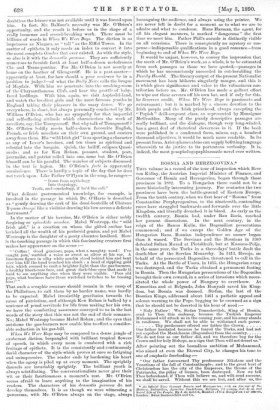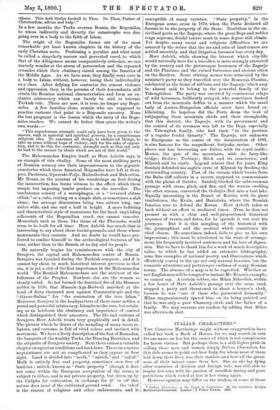BOSNIA AND HERZEGOVINA.* THIS volume is a record of the
tour of inspection which Herr von Ktillay, the Austrian Imperial Minister of Finance, and Governor of Bosnia and Herzegovina, began through those provinces in 1882. To a Hungarian there could not be a more historically interesting journey. For centuries the two provinces have been the battle-ground of Eastern Europe. From the tenth century, when we first hear of " Bosona " from Constantine Porphyrogenitus, to the nineteenth, contending races have struggled backwards and forwards over the little Kingdom, and literally drenched it in blood. As early as the twelfth century, Bosnia had, under Ban Boris, reached her present dimensions. In the next century, in the reign of the Banns Kulin, the Bogomilian persecutions commenced ; and if we except the Golden Age of the Hungarian Bans, Bosnian independence no sooner began than it waned. The Servians and the Bosnians in 1389 defeated Sultan Murad at Plotshknik, but at Kossovo-Polje, in the same year, the Turks in a three-days' battle dealt the death-blow of the Servian Monarchy. In 1413, Hrvoja, on behalf of the persecuted Bogomiles, threatened to call in the Turks. At the Battle of Usora, in 1415, the Hungarian army was destroyed, and the Turks obtained a permanent footing in Bosnia. Then the Hungarian persecutions of the Bogomiles brought their own reward, in a series of invasions which neces- sitated the whole power of Hungary to overthrow. At Kunovitza and at Belgrade, John Hunyadi saved his King- dom, but Bosnia was doomed. Stefan, the last of the Bosnian Kings, addressed about 1461 a pathetic appeal and solemn warning to the Pope, begging to be crowned as a sign that he should not be deserted in his hour of need :—
" Holy Father ! We, Stefan Tomashevitsh, King of Bosnia, send to Thee this embassy, because the Turkish Emperor Muhammed will attack us in the coming year, and his army stands in readiness. We shall not be able to withstand such power.
Thy predecessor offered our father the Crown Our father hesitated because he feared the Turks, and had not yet expelled the Manicheans (Bogomiles) from the country We do not fear as our father did, and we therefore beg for the Crown and for holy Bishops, as a sign that Thou will not desert us."
After pointing out the boundless ambition of Muhammed, who aimed at even the Eternal City, he changes his tone to one of emphatic foreboding:—
" Our father forewarned Thy predecessor Nikolaus and the Venetians of the fall of Constantinople ; and to the great hurt of Christendom has the city of the Emperors, the throne of the Patriarchs, the pillar of Greece, been destroyed. Now we tell Thee beforehand, if Thou wilt believe us, and wilt send succour, we shall be saved. Without this we are lost, and after us, the • An Official Tour through Bosnia and Herzegoo:na with an Alec ■unt of the History, Antiquities, Agrarian Conditions, Religion, It nclogy, lot; -Lei's, and Social Life of the People. By J. de Aabab, Member (.1 tl e Hungarian 1 an'amsnt. London: Swan Sonnenechein and Co.
others. This doth Stefan foretell to Thee. Do Thou, Father of Christendom, advise and help ! "
In a few months the Turks overran Bosnia, the BogoMiles, to whom indirectly and directly the catastrophe was due, going over in a body to the faith of Islam.
The origin of the Bogomiles forms one of the most remarkable yet least known chapters in the history of the early Christian sects. Professing a peculiar and what must be called a singularly narrow and perverted creed, to which that of the Albigenses seems comparatively orthodox, we can scarcely wonder at the storm of persecution and the repeated crusades which their obstinacy raised among the fanatics of the Middle Ages. As we have seen, they finally went over in a body to Islam, without, however, losing their individuality as a class. After defying for centuries the utmost violence and oppression, they, in the persons of their descendants, still retain the Bosnian national characteristics, and form an ex- clusive aristocracy which can barely be said to tolerate Turkish rule. There are now, it is true, no longer any Bogo- miles. A few families alone remain who are supposed to practise customs that point to a Bogomile ancestry. None the less pregnant is the lesson which the story of the Bogo- miles teaches. We cannot do better than quote the writer's own words :- " This superhuman strength could only have been given to the masses, sunk in material and spiritual poverty, by a superhuman religious idea. To renounce all things, to endure all things, to take up arms without hope of victory, only for the sake of opposi- tion, and to do this for centuries : strength such as this can only be lent to the masses by ideals which are not of this world."
The Mahommedan Empire itself, as Herr AsbOth says, is an example of this vitality. Some of the most striking parts of Bosnian scenery owe their impressiveness to the gigantic cemeteries which these fanatical Bogomiles have left at Sera- jevo, Pavlovatz, G-yaurski-Polje, Radmilovitsh and Bnkovitza. Mr. Evans, in the account of his wanderings on foot during the insurrection, has borne witness to the effect which these simple but imposing tombs produce on the traveller. The tombstones consist of a sarcophagus, or a " reversed obtuse oblisk," or a cube, resting on a simple slab, or sometimes a slab alone; the average dimensions being two metres long, one metre wide, and one and a half in height. A more befitting and characteristic style of monument for the hard, unyielding adherents of the Bogomilian creed, one cannot conceive. Memorials such as these, like those of the Pharaohs, would seem to be built for all time. Herr AsbOth has much that is interesting to say about these burial-grounds, and those whose monuments they contain. And no doubt he would have pre- ferred to confine himself to the archaeological features of his tour, rather than to the Bosnia of to-day and its people.
He naturally begins his reminiscences with the city of Serajevo, the capital and Mahommedan centre of Bosnia. Serajevo was founded during the Turkish conquest ; and if it cannot lay claim to much historical interest previous to that era, it is yet a city of the first importance in the Mahommedan world. The Bosniak Mahommedans are the strictest of the followers of the Prophet. Nowhere else are the women so closely veiled. So hot burned the fanatical fire of the Bosnian nobles in 1830, that Hussein-Aga-Berberli marched at the head of forty thousand men against Constantinople and the " Gyaur-Sultan " for " the restoration of the true Islam." Moreover, Serajevo is the headquarters of these same nobles, a proud and powerful aristocracy, Islamite to the core, but retain- ing as an heirloom the obstinacy and impatience of control which distinguished their ancestors. The life and customs of Serajevo, Herr AsbOth treats very graphically and in detail. The picture which he draws of the mingling of many races, re- ligions, and customs, is full of vivid colour and instinct with movement. We have a lively description of the fast of Ramadan, the banquets of the wealthy Turks, the Dancing Dervishes, and
the etiquette of Serajevo society. Next there comes a valuable chapter on agrarian conditions and land-laws. These on a nearer acquaintance are not so complicated as they appear at first sight. Land is divided into " mulk," " mirieh," and " vakuf." Mulk is entirely free real property, sometimes even free of land-tax ; mirieh, known as " State property " (though it does not come within the European acceptation of the term), is subject to tithes, and is not private property, but t ;yen up by
, r the Caliphs for cultivation, in exchange for • es (of this nature does most of the cultivated ground cons', the vakuf is the estates of religious and other endowments, and is susceptible of many varieties. " State property," in the European sense, arose in 1870, when the Porte declared all forests to be the property of the State. Doubtless in the un- civilised parts as the Zagorje, where the great Begs and nobles reign supreme, feudal tenure must in some degree still obtain. Yet despite many racial and religious difficulties, we are assured by the writer that the ins and outs of land-tenure are settled smoothly, and that litigation becomes less every day.
Herr AsbOth, while showing the interest which city-life would naturally have for a traveller, is more strongly attracted by the scenery and the picturesque horsemen of the Zagorje and the Planinas, and the ruined fortresses and ancient cities on the Borders. Some stirring scenes were witnessed by the minister's party as they travelled over the Romanja-Planina, celebrated as the home of robbers, and the Zagorje, which may be almost said to belong to the powerful family of the Tshengitshes. The party was escorted by continuous relays of wild horsemen, brilliantly arrayed, who sometimes dashed out from the mountain defiles in a manner which the small body of Austro-Hungarian officials must have found ex- hilarating. So hopeless did the Porte deem the task of subjugating these mountain chiefs and their strongholds, that this district, the Zagorje, with its government and the control of its revenues was left to the Begs, especially the Tshengitsh family, who had risen " to the position• of a regular feudal dynasty." The Zagorje, not unknown to Europeans as the centre of the insurrection of 1881, is also famous for the magnificent Sutjeska ravine. Other places not less interesting are Jaitze, with its royal castle; Mostar, the gate of the mountains, with its fairy-like bridge ; Stolatz ; Trebinje ; Bilek and its cemeteries ; and Kljutsh and its castle. Legend relates that for years King Sandalj defended his eagle's eyrie of Kljutsh by flooding the surrounding country. Part of the stream which bursts from the Baba cliff collects in a cavern supposed to communicate with the plains of Gatsko. Sandalj blocked the subterranean passage with stone, pitch, and flax, and the waters swelling the other stream, converted the Golinjev-Dol into a vast lake. Equally interesting is the Desert of Korito, with its giant tombstones, the Krain, and Banialnka, where the Bosniak fanatics rose to defend the Koran. Herr AsbOth takes us back without an effort to mediaeval times. True, he does not present us with a clear and well-proportioned historical sequence of events and dates, for he spreads it out over his journeys. But it is this mingling of the historical with the geographical and the scenical which constitutes his chief charm. He sometimes, indeed, fails to give us his own impressions ; this must be attributed to his want of arrange- ment, his frequently involved sentences, and his love of digres- sion. But we have to thank him for a work of much descriptive value, to which he has added an extensive bibliography,. some fine examples of national poetry, and illustrations which effectively convey to the eye not only natural beauties, but the romantic situations and picturesque outlines of many Bosnian towns. The absence of a map is to be regretted. Whether or not Englishmen will be tempted to imitate Mr. Evans's example, we cannot say. A certain robber, one Milan Nikovitsh, within a few hours of Herr Asboth's passage over the same road, stopped a party and threatened to shoot a lawyer's clerk, because he was " one of those who persecuted humanity." Milan magnanimously spared him, on its being pointed out that be was only a poor Chancery clerk, and the father of a family. We may reassure our readers by adding that Milan was afterwards shot.







































 Previous page
Previous page